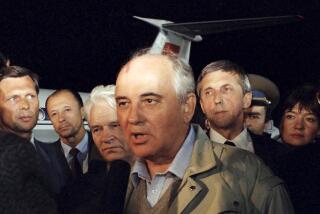West’s Leaders Dismayed at Resignation : Reaction: Officials fear that Shevardnadze’s departure might mean a reversal in Moscow’s foreign policy.
- Share via
LONDON — Western leaders reacted with shock and dismay Thursday to the decision by Soviet Foreign Minister Eduard A. Shevardnadze to resign in protest over trends in his government.
Calling Shevardnadze a prime mover in improved East-West relations, officials in Washington expressed apprehension that his departure might signal a reversal in Moscow’s foreign policy.
In Europe, many leaders suggested that the resignation reflects a grave political crisis in the Soviet Union, one that puts in doubt the future of President Mikhail S. Gorbachev.
“We were all surprised,” White House Press Secretary Marlin Fitzwater said in Washington, indicating that President Bush and other high officials got the word from early morning news reports.
Bush discussed the implications with Secretary of State James A. Baker III and his national security adviser, Brent Scowcroft, but made no public comment.
Shevardnadze was highly regarded as a diplomat by Western leaders, who credited him with helping to end the Cold War. They were charmed by his personality and impressed by his ability to compromise when necessary to make breakthroughs in such sensitive negotiating areas as arms control.
He was an astute politician whose warmth and open manner first appealed in the United States to former Secretary of State George P. Shultz.
Baker, who developed an even closer rapport with Shevardnadze during the past two years, said the Soviet official gave no hint of his plans to resign during their recent meeting in Baker’s hometown, Houston.
“I am proud to call this man a friend,” Baker said at a Washington news conference. “A man of his word, a man of courage, conviction and principle. . . . And I’m convinced that the dramatic moves toward democratization and freedom in Central and Eastern Europe, and the new thinking in Soviet foreign policy, would never have happened without his and President (Mikhail S.) Gorbachev’s courageous leadership.”
In a White House statement, Fitzwater described Shevardnadze as “an important figure in the positive evolution of U.S.-Soviet relations over the past five years.” Then, in a significant signal to the Kremlin, the statement added: “We have every reason to want to see that process continue.”
Senate Majority Leader George J. Mitchell (D-Maine)--noting that the Persian Gulf crisis would be far more complex if the United States and the Soviet Union were at odds instead of voting together in the United Nations--also expressed hope for continuity in Moscow’s policy.
In London, former Prime Minister Margaret Thatcher praised Shevardnadze, declaring: “He’s a statesman of world renown, and he was a great and enthusiastic supporter of reforms.”
British Foreign Secretary Douglas Hurd said he is “very sad” about the resignation and is watching events in the Soviet Union with “great sympathy.”
In Brussels, Secretary General Manfred Woerner of the North Atlantic Treaty Organization praised Shevardnadze for his role in helping to end the Cold War.
In Germany, Foreign Minister Hans-Dietrich Genscher, who had spent many hours with Shevardnadze working out a formula for the Soviet approval of German reunification, called the resignation a “great loss to Germany.” And German Chancellor Helmut Kohl said he hopes “Gorbachev will pull through.”
In Rome, Italian Foreign Minister Gianni De Michelis, current head of the European Council of Ministers, said that the resignation “is certainly a sign of great tension which exists at this moment in the Soviet Union and Moscow.”
French Foreign Minister Roland Dumas called Shevardnadze’s resignation “a cry of alarm,” adding that “it will serve as a warning to Western countries and to all who drag their feet” in offering economic aid to the Soviets.
Tuohy reported from London and Eaton reported from Washington.
More to Read
Sign up for Essential California
The most important California stories and recommendations in your inbox every morning.
You may occasionally receive promotional content from the Los Angeles Times.













